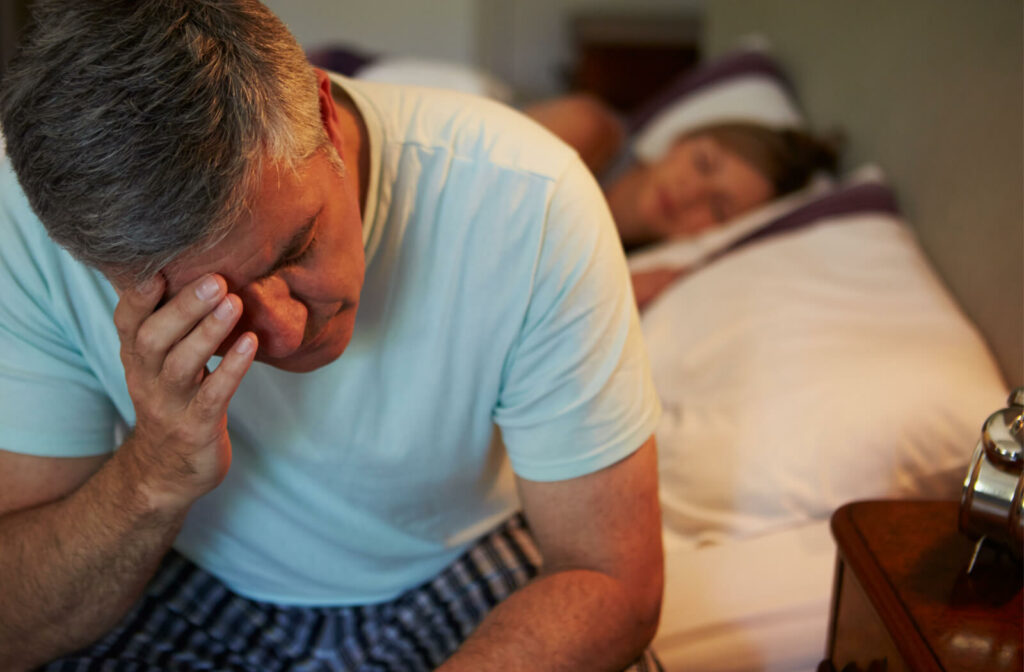Many people don’t necessarily associate sleeping well with dentistry, but dentists can be essential to determine if you have sleep apnea.
You may have heard of sleep apnea before, but you may not be entirely sure what it is or whether you have it. Sleep apnea is a common sleep disorder that may affect not only your sleep but your partner’s as well.
You may realize you have sleep apnea if you constantly wake up through the night, though sometimes a family member or partner will pick up on the signs first.
A good night’s rest is essential to getting the most out of your day. Leaving sleep apnea untreated can have serious consequences. Fortunately, your dentist has access to technology that can help diagnose and treat sleep apnea effectively.
What is Sleep Apnea?
Sleep apnea is a sleep disorder that causes your breathing to repeatedly stop and start while you’re sleeping. These pauses are called apneas and can last 10–30 seconds at a time. They can also happen many times throughout the night, constantly interrupting your rest and potentially cutting off oxygen from your brain and body, leading to various health problems.
There are 3 main types of sleep apnea:
Obstructive Sleep Apnea (OSA)
Obstructive sleep apnea is the most common type of sleep apnea. It happens when the muscles in the back of your throat fail to keep your airway open. This makes the soft tissue collapse, blocking the upper airway. It can also happen if you have a narrow airway, a large tongue, or extra tissue in your throat.
While snoring is common for people with this type of sleep apnea, simply snoring alone doesn’t necessarily mean you have it. It’s a decent first sign, but there are other tests your dentist can run.
Central Sleep Apnea (CSA)
Central sleep apnea is a rarer form related to how your brain communicates with your throat muscles. In the case of CSA, your brain can’t send the proper signals telling you to breathe.
This condition can be a secondary effect of other health conditions affecting the brain, but it can also happen without a known underlying cause. Experts aren’t entirely sure why CSA happens, but it seems more common in infants than adults.
Mixed Sleep Apnea
Certain people can be affected by a combination of OSA and CSA, but it’s relatively rare.
Risk Factors of Sleep Apnea
Sleep apnea can affect anyone, regardless of age or gender. However, certain risk factors can increase your chances of developing OSA, such as:
- Age
- Sex
- Obesity
- Anatomy of your head and neck
- Smoking
- Genetics
- Nasal congestion
Sleep apnea can also worsen in people who sleep on their back since that position can cause soft tissue to collapse into your airway.

Symptoms of Sleep Apnea
Since sleep apnea symptoms typically occur while you’re asleep, it can be difficult to notice them on your own. A partner or family member can tell you if they notice something, but that’s not always reliable.
The first signs you notice might be how the lack of sleep affects your day. Symptoms of sleep apnea you can look out for include:
- Long-lasting morning headaches
- Loud snoring followed by silence
- Snoring with gasping or choking
- Tiredness
- Dry mouth after waking up
- Constantly waking up through the night
- Frustration or irritability
- Lack of focus throughout the day
The Dangers of Sleep Apnea
Sleep apnea can sometimes do more than ruin your sleep. It can also affect your overall health. When you’re not breathing, you’re not getting oxygen into your body. This lack of oxygen can lead to side effects that reach far beyond tiredness. Worse, it starts a vicious cycle where you’re unable to sleep, affecting your health and making it even harder to sleep.
If not treated, sleep apnea may lead to:
- High blood pressure
- Stroke
- Heart attack
- Heart disease
- Diabetes
- Depression
- Pulmonary hypertension
- Nonalcoholic fatty liver disease
- Injuries from being exhausted at work or while driving
Sleep Apnea Treatments
The good news is that sleep apnea is treatable, and several effective solutions are available using modern and high-tech methods. However, the treatment for you depends on your sleep apnea’s severity and underlying causes.
- Continuous Positive Airway Pressure (CPAP): a CPAP machine is the most common treatment for moderate to severe obstructive sleep apnea. It involves wearing a mask over your nose or mouth while you sleep, which delivers a steady stream of air pressure to keep your airway open.
- Oral appliances: By wearing a custom-fit mouthguard-like device while you sleep, you may be able to reposition your jaw and tongue to get out of the way and keep your airway open. These devices are typically prescribed if you’ve already tried a CPAP and found it doesn’t work.
- Getting exercise: Since being overweight can increase your risk of developing sleep apnea, you may be able to improve the quality of your sleep by getting active.
- Lifestyle changes: Making lifestyle changes such as sticking to a regular sleep schedule, quitting smoking, and avoiding alcohol and sedatives may also help improve sleep apnea symptoms.
- Surgery: In severe cases, surgery can be an option to remove excess tissue.
Breathe Easy Again
If you think you or your loved one may have sleep apnea, it’s essential to seek treatment as soon as possible to improve your sleep quality and overall health. Hometown Dental uses modern techniques to assess your symptoms and offer the best treatments we can to help you get restful sleep.
Book an appointment with our team today and take your first step towards a better night’s sleep.





